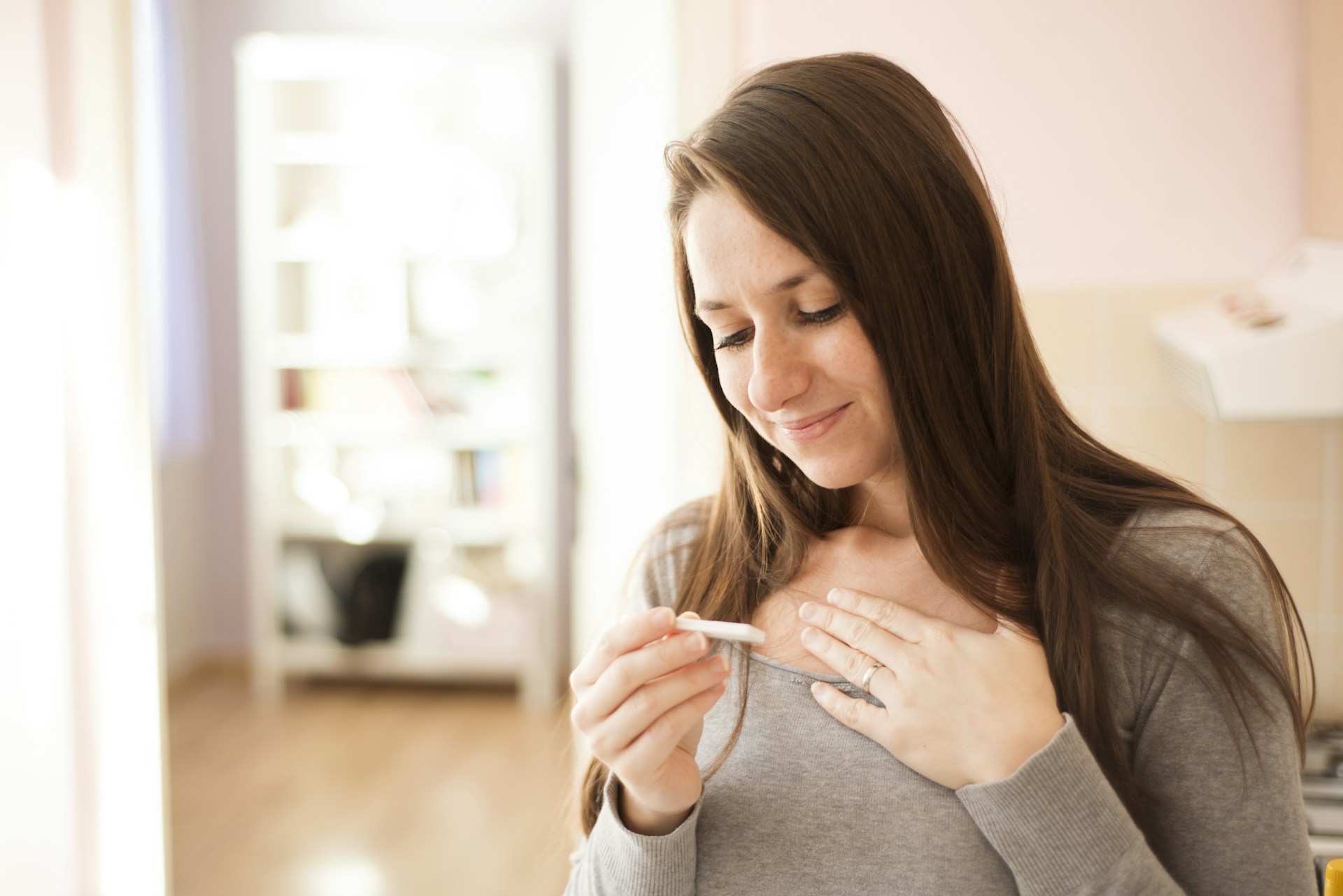Trying to conceive doesn't always feel sexy but is heightened arousal a sign you're ovulating? Here's what the research says, or doesn't say, about fertile window sex fantasies.

Trying to conceive doesn't always feel sexy but is heightened arousal a sign you're ovulating? Here's what the research says, or doesn't say, about fertile window sex fantasies.
The fertile window of your cycle is hard to detect, but it can often have you feeling all off-kilter. Your hormones are peaking, your emotions are all over the place, and if you’re trying to conceive (TTC) naturally, you’re probably having a lot of sex—or at least attempting to have a lot of sex.
Because this period is so important for people that are TTC, some scientists have set out to study the relationship between fertility and fantasy. They wanted to figure out whether sex drive in the ovulatory phase (your body wanting sex more than usual) during the fertile window, when it’s more likely you’ll conceive.
What is the fertile window?
The ovulatory phase of your cycle is the time when an egg is released from the ovaries and begins to travel through the fallopian tubes—which means it’s also the point at which a sperm cell can intercept that egg, and you can become pregnant.
The fertile window begins right before the ovulatory phase because sperm can stay alive in the reproductive tract for several days after ejaculation. This means that the sperm cells are able to hang out for a while, waiting for an egg to arrive. Eggs, on the other hand, only are viable for up to 24 hours after they are released from the ovaries, so your fertile window ends one day after you ovulate.
Tracking your cycle can help you figure out when your ovulatory phase starts and ends, which can be useful for purposes of attempting to conceive.
How does arousal work?
Arousal is the physiological state of becoming ready to have sex. All bodies can respond to arousal differently, but there are some common symptoms, such as a faster heart rate and heightened blood pressure. Vaginas tend to respond to arousal by becoming wet with lubricant, and an influx of blood can make parts of the vulva swell up and become more responsive to stimulation. Arousal can also cause swelling in the breasts and make nipples hard.
Hormonal levels do not necessarily fluctuate with arousal, unlike they do during the phases of the menstrual cycle. This means that when you’re physically turned on, there isn’t a rush of hormones into your system.
However, hormones can be linked to desire, which is a mental state rather than a physical one.
Do you have more sexual fantasies during your fertile window?
It would make sense from an evolutionary standpoint for women to feel more arousal and want to have sex more during their fertile windows. That said, the science surrounding this topic is inconclusive due to its small scale and the existence of contradictory research.
In one 2012 study, people identifying as women were asked to keep diaries about their sexual fantasies over the course of several months in order to explore “cyclical shifts in women’s fantasies and interests.”
This research, which was performed on only 22 heterosexual women, concluded that women were more likely to fantasize about men during the fertile window of their menstrual cycle.
In a 2010 study of ovulatory shifts in female sexual desire, researchers found that females who were “mated,” i.e. in heterosexual relationships, also experienced a rise in sexual fantasy during the period when they were most likely to conceive.
This study contributed to the dual-mating hypothesis, an evolutionary theory that states that women choose their partners based on two criteria: physical fitness, and the longevity they see in a relationship.
In an article published in 2019, however, these findings and others were called into question, showing results from other studies that were inconsistent with the dual-mating hypothesis. Today, the question of exactly how fertility and fantasy are linked remains unanswered.
How does this research apply to queer people?
The research linking sexual desire to the fertile window has historically failed to consider the experiences of queer people.
The 2012 diary-based study explicitly limited their scope to heterosexual women, but even within that group, 52% reported having sexual fantasies involving women. The study found that the proportion of men that featured in these women’s sexual fantasies only increased by one percentage point during their fertile window. The study concluded that this was enough evidence of a biological preference to have sex with men for reasons of natural selection.
In fact, one of the researchers, Samantha J. Dawson, told LiveScience in 2012 summarized the results by explaining that during a person’s fertile window, “You're going to want to have sex with someone who can actually pass genes on to you, so a man versus a woman”. This statement uses the study to improperly justify a worldview that queerness is evolutionarily disadvantageous.
When science is used to explain away groups that aren’t even included in the scope of the study, it should be a telltale sign to raise an eyebrow at any results.
The takeaway
Despite various theories that have been posited about the relationship between sexual fantasy and the window of fertility, more research is necessary to determine the nature of that relationship. Does fantasy have its roots in ovulation? If you feel sexy, are you more likely to conceive? It’s hard to give a solid yes or no based on the research.
The truth is, it’s impossible to predict when your feelings of arousal will surface.
One thing is for certain: when you’re TTC, it can feel surprisingly unsexy. If you’re trying for a natural pregnancy, your body is hormonal, which comes with its ups and downs; if you’re looking to do IVF, conception doesn’t begin with sex at all, but rather a series of tests and procedures.
TTC can start to feel like a chore whether you’re having sex or not, and it can often feel like you’ve tried everything and everything still isn’t enough.
That means that you need to meet your body where it is. Are you feeling sexy? Go have sex! And remember that if you’re not feeling particularly fantastical, it’s not necessarily a sign that you are more or less fertile.
About the author

Sources
- Dawson SJ et al. (2012). Sexual Fantasies and Viewing Times Across the Menstrual Cycle: A Diary Study
- Dawson SJ & ML Chivers. (2014). Gender Differences and Similarities in Sexual Desire
- Jones BC, et al. (2019). Ovulation, Sex Hormones, and Women’s Mating Psychology
- Pillsworth EG, et al. (2010). Ovulatory Shifts in Female Sexual Desire
About the Oova Blog:
Our content is developed with a commitment to high editorial standards and reliability. We prioritize referencing reputable sources and sharing where our insights come from. The Oova Blog is intended for informational purposes only and is never a substitute for professional medical advice. Always consult a healthcare provider before making any health decisions.



